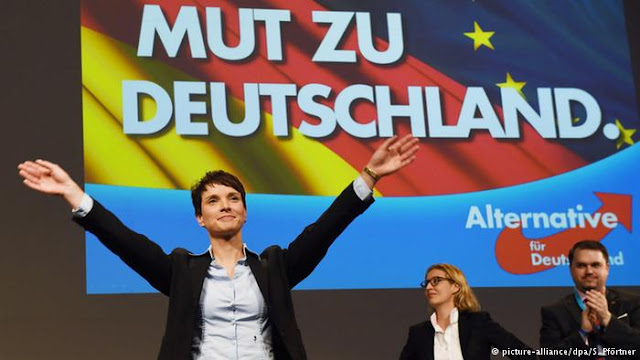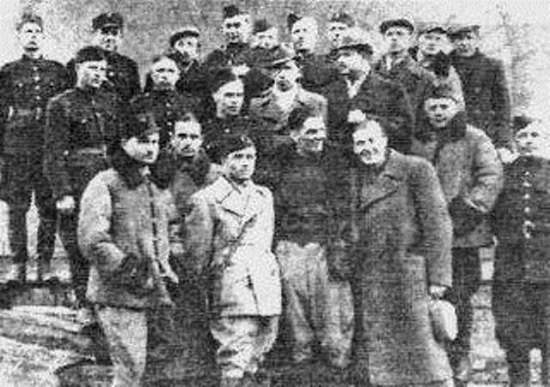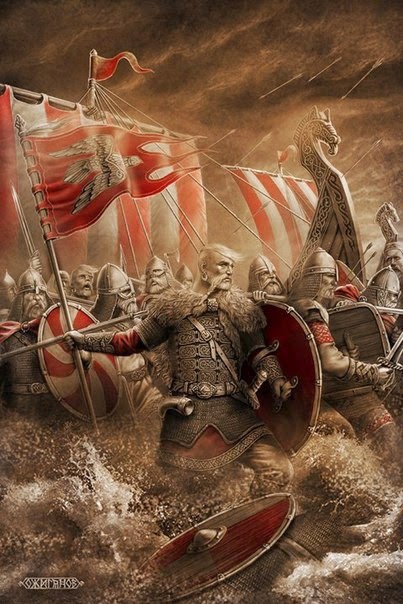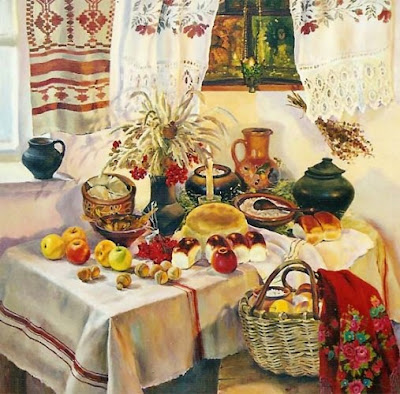SUCCESS OF THE GERMAN RIGHT AND THE INTERMARIUM PERSPECTIVES
As it is known, at the recent election in Germany the "Alternative for Germany" (AfD) nationalist political party have shown quite successful result in Mecklenburg, Western Pomerania and Berlin. However, most part of nationalist and conservative minded Poles has took these news warily. The main reason for that is concern that strengthening the AfD positions in German political arena could turn the country's political course towards Moscow. An assumption has been expressed that Alexander Hauland (one of the party leaders) can gain the post of Minister of Foreign Affairs of Germany; in this case the country's foreign policy could become radically pro-Kremlin, which will have disastrous consequences for Poland.
However, those worries expressed by some of Polish political analysts are exaggerated. After all, considering the current situation it is quite clear that the AfD will not be a part of the coalition; in addition after getting into the Bundestag the party will be isolated there. The coalition will be formed formed on the basis of three left-wing parties - he Social Democratic Party of Germany, the Alliance '90 / The Greens party and the Die Linke. Theoretically, by achieving a successful result at parliamentary elections the Alternative for Deutschland could won a "golden share" in the German parliament. But the probability that this scenario will come true is microscopic. I'm not trying to say that the nationalists are unable to form a powerful faction in the German parliament. Even if the fraction will be formed, the AfG will find itself in political isolation since leftists (even being opposite to each other) will always see eye to eye on the matter of how to not allow right forces to gain power.
However, those worries expressed by some of Polish political analysts are exaggerated. After all, considering the current situation it is quite clear that the AfD will not be a part of the coalition; in addition after getting into the Bundestag the party will be isolated there. The coalition will be formed formed on the basis of three left-wing parties - he Social Democratic Party of Germany, the Alliance '90 / The Greens party and the Die Linke. Theoretically, by achieving a successful result at parliamentary elections the Alternative for Deutschland could won a "golden share" in the German parliament. But the probability that this scenario will come true is microscopic. I'm not trying to say that the nationalists are unable to form a powerful faction in the German parliament. Even if the fraction will be formed, the AfG will find itself in political isolation since leftists (even being opposite to each other) will always see eye to eye on the matter of how to not allow right forces to gain power.
What both the Polish and Ukrainian nationalists really have to worry about is implementation of scenario when the strategy of German international policy will be developed by Social Democrats and the Left. It is such development could make German policy more pro-Kremlin than it is now. Under such circumstances the Green, with their inherent neutral attitude to Moscow, could become a factor that may deter such changes. Everything will be depend on what format of the coalition will be created in the Bundestag aand under what conditions it will happen. Therefore, it is not the fact of strengthening the AdN positions can be unfavorable for Poland and Ukraine, but disadvantageous configuration of the Left parties which will form the future coalition.
As regards the assessment of a model of the AfD foreign policy strategy, here Poles tend to make the same mistake as many Ukrainians, seeing a lobbist of the Kremlin's interests in the face of each right political force of Europe, which representatives once expressed their sympathy to Russia. We will not focus on the issue of the West European right and Moscow and confine ourselves to a single thesis: the fact that some of the West European right movements are pro-Russian for some reason does not means that this Russophilia is their essential feature. In assessing the above political forces must follow the medieval scholastics by distinguishing the "substantial" and "accidental." The "substantial" in ideological and political platform of the West European right political movements is a concern for a national interest. And, therefore, their "Russophilia" must be considered as an "accidental" category - as something secondary and variable.
A systematic coverage of different nuances of pro-Russian moods some of the European right have been demonstrating in recent time is require a separate article. It also is important for us to realize that these moods have clearly situational character and can be altered. However, these changes will not occur without efforts, which the Intermarium countries are making now. In particular it is about Poland, Hungary and Croatia who should be considered as locomotives of the process of Central European integration, and whose governments are showing the most consistent adherence to right and principles.
The Intermarium is able to become a center of attraction for right, conservative forces in those European countries where the complete "turn right" remains impossible. The Intermarium geopolitical project could be a reference point for both those political forces all over the Europe, who are called now "right populists" and more radical (but marginal) groups and civic associations, who pursuing narrow goals (ie pro-life and pro-family organizations who oppose the dictatorship of gender ideology and extreme liberalism).
And the German right are not an exception. All that must be done is to make them to revise their foreign policy guidelines. Pressing problems the German nationalists are trying to resolve are a migration crisis and the excessive centralization of the European Union. Solving these problems coincide with the interests of Intermarium. Under these conditions the national-oriented forces in Germany would work in tandem with the governments of Central and East Europe. At the same time they (the German nationalists) could be a kind of a fifth column, since it is Berlin that is in the core of political processes that are harming for whole Europe.
The Intermarium is not just a regional project, but a cornerstone of building an alternative Europe. And therefore its architects must make every effort to involve to the building process right forces of those states, where local elites continue to conduct their destructive and anti-European policy.
by Igor Zagrebelny






Коментарі
Дописати коментар